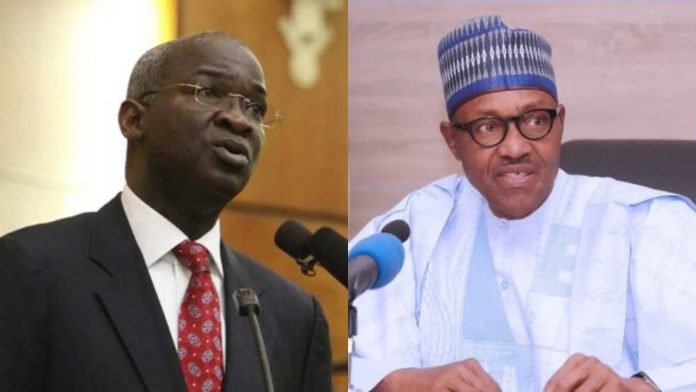Babatunde Fashola, Minister of Works and Housing, has thrown his weight behind President Muhammadu Buhari, stating that his reason for incurring more debt, such that Nigeria’s public credit facilities have soared to N41.6 trillion is justifiable.
This writer understands that in the first quarter of the year (2022), Nigeria’s public debt soared to N41. 6 trillion from the N39. 56 trillion recorded at the end of December 2021, a development that puts the country’s debt servicing under pressure.
Speaking at the closing ceremony of the 28th National Council of Works meeting which was held in Kano, Fashola maintained that ongoing projects across the country had justified the debt, especially when compared to the achievements of Buhari’s predecessor.
“Our first budget in 2016 was over N250 billionn, up from the N18 billion we met in 2015. That was an increase of over a thousand percent, even though the price of crude oil was dropping, we did not raise taxes,” the minister stated.
Fashola, however, revealed that the Buhari-led government had so far been able to deliver no less than 1,800 kilometers of roads across the six geo-political zones, stressing the President’s determination to complete all the ongoing projects before the expiration of its tenure in May next year (2023).
Nigeria’s debt-to-revenue ratio
The Budget Office, in a recently-released data, published that Nigeria’s debt servicing had so far gulped no less than N14 trillion since Buhari resumed office in 2015.
According to the data, under Buhari’s watch, the Nigerian government had spent N14.13 trillion serving both domestic and foreign debts of the country.
The report, which covers between 2015 and 2022, also revealed that no less than N30.58 trillion has been recorded as Nigeria’s budget deficit. Hence, while the Buhari-led administration has spent N54.98 trillion on budget implementation since its inception, it has only been able to finance this spending with N24.39 trillion, leaving a deficit of N30.58 trillion.
With the budget deficit standing at N30.58 trillion, BizWatch Nigeria understands that the country incurs more debts than its earns.
















